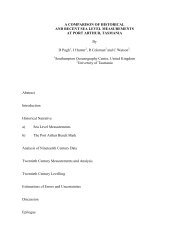Annual report 2005-06.indd - Antarctic Climate and Ecosystems ...
Annual report 2005-06.indd - Antarctic Climate and Ecosystems ...
Annual report 2005-06.indd - Antarctic Climate and Ecosystems ...
You also want an ePaper? Increase the reach of your titles
YUMPU automatically turns print PDFs into web optimized ePapers that Google loves.
ocean control of carbon dioxideCO2-05: BiogeochemicalsimulationsProject leaderRichard Matear – CMARProject staffM Mongin, T Roy, ACE; M Nuñez, L Forbes, UTAS;C Rathbone, T Moore, CMAR; T Trull CMAR/UTASProject AimThrough the development <strong>and</strong> application ofocean carbon models, we are quantifying theSouthern Ocean uptake of atmospheric CO 2<strong>and</strong> exploring potential feedbacks of projectedglobal warming on this uptake. The results ofthis research will be vital to predicting the rolethe Southern Ocean will play in absorbing <strong>and</strong>storing anthropogenic CO 2in the future <strong>and</strong>,therefore, how future atmospheric CO 2levels willevolve.• Investigation of possible microbial ecosystemresponses to elevated iron inputs <strong>and</strong>ocean stratification using a model tuned toreproduce seasonal cycles at the Kerfix PolarFrontal Zone time series site suggests that10-fold increases in aerosol iron deliveryare insufficient to induce significant change,but that 100-fold <strong>and</strong>, especially, 1000-fold increases lead to significant increasesin production <strong>and</strong> changes in ecosystemstructure. Increased stratification ofthe upper water column in response toapproximately 3-fold decreases in windstresses can induce similar increasesin production, emphasising that lightlimitation is also a key factor in SouthernOcean productivity (Mongin et al., GlobalBiogeochemical Cycles, in review).Key achievements in <strong>2005</strong>-06• Simulation of ocean acidification through theend of this century suggests major impactson carbonate-shell forming organisms, <strong>and</strong>that the greatest effects are likely to occurin <strong>Antarctic</strong> waters (in collaboration with US,European, <strong>and</strong> Japanese researchers, Orret al., Nature, <strong>2005</strong>). This work emphasisesthe direct effect of anthropogenic CO 2onmarine ecosystem, which is not dependent onclimate warming.• Assessment of spatial <strong>and</strong> temporal variabilityof air-sea CO 2exchange in the SouthernOcean from a global ocean circulation<strong>and</strong> biogeochemical model suggests thatmeasuring uptake with sufficient precision tocapture interannual variability in the net fluxover the whole Southern Ocean will requirean approximate two-fold improvementspatial coverage by observational networks(Lenton et al., Global Biogeochemical Cycles,in review). Further investigation suggeststhat large scale atmospheric dynamics (theSouthern Annular Mode) are importantdrivers of internannual variability (Lenton<strong>and</strong> Matear, Global Biogeochemical Cycles, inreview).<strong>Antarctic</strong> <strong>Climate</strong> & <strong>Ecosystems</strong> CRC - <strong>Annual</strong> Report <strong>2005</strong>-06 33








